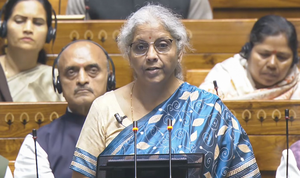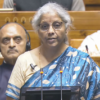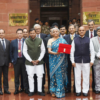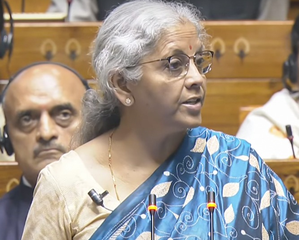India
Sitharaman, team giving finishing touches as Interim Budget enters last lap

New Delhi, Jan 26 (IANS) The preparation of the Interim Budget 2024 has entered the last lap with Finance Minister Nirmala Sitharaman and her team of top Finance Ministry officials giving the final touches to the document as North Block has been put in lock-down mode to ensure complete secrecy after the ‘halwa ceremony’.
According to sources, there is a lot of back and forth with the team of PMO officials headed by P.K. Mishra, Principal Secretary to the Prime Minister, and the Finance Ministry officials.
These discussions ensure that the thrust of the schemes drawn up by the Prime Minister with his close understanding of the ground realities, are adequately presented in the fine-print of the budget.
Finance Secretary TV Somanathan, a Tamil Nadu cadre officer who served as additional secretary in the Prime Minister’s Office (PMO) before joining the Finance Ministry, is a key link between the two teams.
The top members of Finance Minister Nirmala Sitharaman’s team spearheading the budget-making exercise in the ministry include Sanjay Malhotra, the Revenue Secretary, Ajay Seth, Secretary of the Department of Economic Affairs, Tuhin Kanta Pandey, Secretary of the Department of Investment and Public Asset Management, Vivek Joshi, Secretary of the Department of Financial Services and V Anantha Nageswaran, the Chief Economic Advisor.
During the printing of the Union Budget in North Block, most officials have to stay put in the office with no communication with the outside world during the days ahead of the budget. It is only after the budget is presented on Feb1 that they will be allowed to go home.
The last week is the culmination of a 6-month budget preparation exercise in which all the ministries such as agriculture, rural development, industry, power, highways and ports prepare their estimates and present them to the Finance Ministry.
The Finance Minister assisted by her team then goes through the proposals and puts them together in close consultation with the PMO taking into account the overall fiscal deficit and the relative allocations that have to be made with the government policies aimed at pushing growth and inclusive development.
Sitharaman is poised to present the interim budget for the fiscal year 2024-25 on February 1, making her only the second finance minister of the country to present a budget in Parliament for the sixth time in a row after Morarji Desai.
The full budget for 2023-24 will be presented after the formation of the new government following the 2024 general elections.
An Interim Budget is presented by a government that is in its last year in office ahead of the Lok Sabha elections.
The need for an interim budget arises because a fresh approval is required from Parliament to withdraw money from the Consolidated Fund of India to run the government as the existing 2023-24 Budget is valid only till March 31 this year.
Since the Lok Sabha elections are being held in April-May this year, funds will be required to run the country till the new government takes over. The interim budget is a practical arrangement that enables the government to fill this gap.
An Interim Budget is similar to a Union Budget in that ruling government tables in Parliament the estimates of its expenditure, revenue, fiscal deficit and financial performance and projections for the upcoming financial year.
Although major tax proposals are not made, the ruling government can tweak some taxes as it did when it raised the income tax deduction limit to give salaried professionals some relief ahead of the 2019 Lok Sabha elections.
The government does not make any major policy announcements during the Interim Budget which could financially burden the next elected government that will present the full Union Budget.
According to the Election Commission’s Code of Conduct, the government cannot include any major scheme in the Interim Budget as it could influence voters.
The government also does not present the Economic Survey along with the Interim Budget which is done a day before the presentation of the main budget.
India
Without justice existence of any nation is not possible: PM Modi
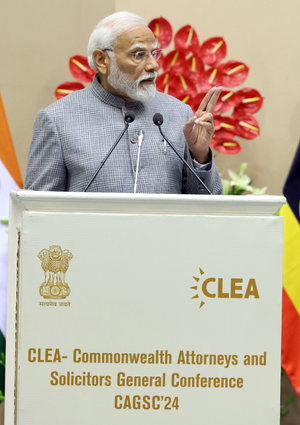

New Delhi, Feb 3 (IANS) Prime Minister Narendra Modi on Saturday said that without justice the existence of any nation is not possible.
“Justice is at the root of independent self-governance and without justice even the existence of any nation is not possible,” Modi said while during the inauguration of the Commonwealth Legal Education Association (CLEA) – Commonwealth Attorneys and Solicitors General Conference (CASGC) in New Delhi.
He said when a society collaborates that it is easy to understand each other’s system better.
“Greater understanding brings greater synergy; synergy boosts better and faster justice delivery,” he said.
The theme of the conference was ‘Cross-Border Challenges in Justice Delivery’. The conference will deliberate on important issues pertaining to law and justice like judicial transition and the ethical dimensions of legal practice; executive accountability; and revisiting modern-day legal education, among others.
Throwing light on the radical changes in the nature and scope of crime in recent times, PM Modi pointed out the vast networks created by criminals across countries and their usage of the latest technology both in funding and operations.
He also drew attention to the fact that economic crimes in one region are being used to fund activities in other regions, and the challenges of the rise of cryptocurrency and cyber threats.
He also highlighted that reform cannot take place without making the justice system more citizen-centric as ease of justice is the pillar of justice delivery.
On Lok Adalats or ‘people’s court’, he said that it provides a settlement mechanism for small cases related to public utility services and is a pre litigation service where thousands of cases are resolved while ensuring ease of justice delivery.
Giving insights into realising the potential of women in every domain, PM Modi suggested making each domain inclusive at the educational level.
He said that an increase in the number of women in law schools will lead to an increase in the number of women in the legal profession.
He also suggested exchanging ideas on how more women can be brought into legal education.
PM Modi pointed out that India’s legal system was inherited from colonial times, but the last few years have witnessed a record number of reforms.
He mentioned the abolition of thousands of obsolete laws from colonial times, some of which had the potential to become tools to harass people, and underlined that it has boosted ease of living and ease of doing business.
“India is also modernising laws to reflect the present realities,” Modi said, highlighting that the three new legislations have replaced more than 100-year-old colonial criminal laws.
“Earlier, the focus was on punishment and penal aspects. Now, the focus is on ensuring justice. Therefore, citizens have a sense of assurance rather than fear,” he said.
India
Tasking Ahmed requests BCB to not consider him for Test cricket: Report
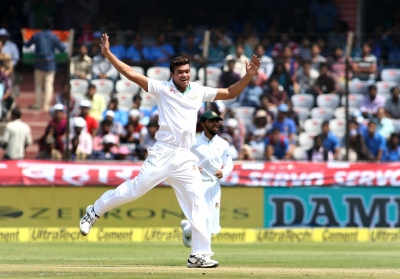

New Delhi, Feb 3 (IANS) Bangladesh pacer Taskin Ahmed has requested the Bangladesh Cricket Board (BCB) to not consider him for Test cricket as he is battling a lingering shoulder injury, and desires to focus solely on white-ball cricket, according to a report.
Cricbuzz reported that Taskin has written a letter to the Bangladesh Cricket Board (BCB), pleading for consideration in limited-overs formats to aid his recovery. BCB officials confirmed the development to Cricbuzz but emphasized the need for a comprehensive discussion after the ongoing Bangladesh Premier League (BPL) season.
“He (Taskin) had sent a letter stating that he does not want to play longer-version cricket. After the game (of the ongoing BPL) is over, we will sit with him in this regard,” said Jalal Yunus, BCB’s cricket operation chairman to Cricbuzz.
The decision awaits the input of head coach Chandika Hathurusingha, who has been informed about Taskin’s intentions.
Taskin’s shoulder injury, sustained during the World Cup 2023 match against India, has been a persistent hurdle in his career. Following the tournament, Taskin was sent to a rehabilitation program to regain full fitness and start competitive cricket again. As a result, he missed the two-match Test series at home against New Zealand and the white-ball return tour that followed soon after.
The dilemma extends beyond the pitch, as Taskin faces the prospect of surgery and a prolonged absence from the game. The BCB’s cautious approach, evident in denying Taskin a NOC for the Indian Premier League (IPL), showcases their concerns about the injury-prone fast bowler.
Interestingly, Mustafizur Rahman, another prominent pacer from Bangladesh too opted out of red-ball cricket to focus on white-ball formats.
While BCB granted NOC to Mustafizur for the IPL, the decision remains contentious for Taskin and Shoriful Islam, both representing the country in Test cricket.
India
Now, drones to monitor illegal mining activities in Gurugram, Nuh


Gurugram, Feb 3 (IANS) The mining department will soon start using drones to keep tabs on illegal mining in Gurugram and Nuh districts.
Recently, the district administration of Gurugram and Nuh have received complaints regarding illegal mining in Rithoj village in Gurugram and Nuh after which the department has decided to use drones to keep an eye on illegal mining.
Anil Atwal, the Mining Officer of Gurugram, who also has additional charge of Nuh distinct said, the department has sent a recommendation of three drones — one for Gurugram district and two for Nuh district — to Gurugram Metropolitan Development of Authority (GMDA) to keep an eye on illegal mining in both the districts.
“Once drones would be procured on time and made available to the mining department, the team will every week conduct survey wherever illegal mining is suspected,” he said.
The officer further said with the help of drones, it will be easy for the officials to access the situations of illegal mining and will also keep an eye on people and vehicles involved in illegal mining.
“With the help of drones, it will be easy for us to keep a watch on large areas of suspected mining locations. If we receive any complaint regarding illegal mining, the team will visit the spot and fly the drones to access the current situation of the spot,” he said.
Atwal also informed that from April 2023 to January 2024, around 46 vehicles, involved in illegal mining, have been seized in Gurugram while 147 vehicles were seized in Nuh district and a fine has been imposed on them.
India
CJI Chandrachud bats for equitable access to legal education
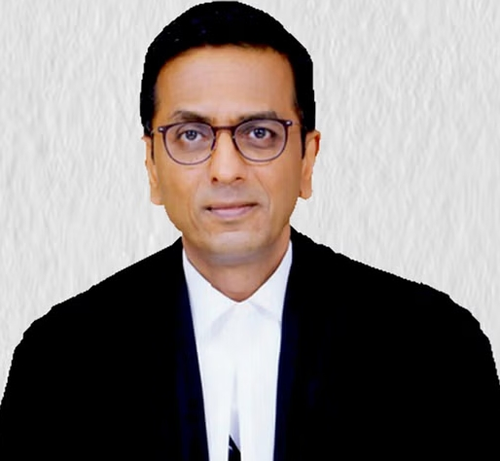

New Delhi, Feb 3 (IANS) Batting for equitable access to legal education, Chief Justice of India (CJI) D.Y. Chandrachud on Saturday said that admissions processes to law schools should not only consider academic performance but also factors such as socioeconomic background, diversity, and life experiences.
Delivering an inaugural address at 2024 Commonwealth Attorneys and Solicitors General Conference (CASGC), CJI Chandrachud said that as we strive to modernise legal education, we must also confront the question of equitable access to legal education.
“Entrance tests for admission to law schools must not be exclusionary. We must ensure that our admissions processes are fair, transparent, and inclusive,” he said.
Speaking further, CJI Chandrahcud said that law officers serve as the primary point of contact between the courts and the government and they not only function as representatives of the government but also as officers of the court.
“Law officers bear a greater responsibility in upholding ethical standards compared to private practitioners, given their role as guardians of the rule of law. …It is imperative that law officers remain impervious to the politics of the day and conduct themselves with dignity in court, ensuring the integrity of legal proceedings,” he said.
The Supreme Court has repeatedly emphasised that law officers and professionals should not only assist the administration of justice but also uphold the honour of the legal profession through exemplary conduct from both within and outside the courtroom, he added.
Citing eCourts Project which aims to leverage technology to improve access to justice for all citizens, CJI Chandrachud said that technology should bring about a transformation, not just automation.
“We must ensure that technological solutions are designed keeping in mind equity and inclusivity, taking into account the diverse needs and capabilities of all our stakeholders,” he said.
Chief Justice Chandrachud said that the Sustainable Development Goals — calling for action to end poverty, protect the planet, and ensure prosperity for all — resonate deeply with our core constitutional principles of justice, equality, and human rights and these goals are not specific to just India but are intrinsic part of all legal systems.
Prime Minister Narendra Modi on Saturday inaugurated the Commonwealth Legal Education Association (CLEA) – Commonwealth Attorneys and Solicitors General Conference (CASGC) 2024 at Vigyan Bhawan.
The Conference will see participation of Attorney Generals and Solicitors from the Commonwealth nations spanning the Asia-Pacific, Africa, and the Caribbean along with various international delegations.
The conference themed ‘Cross-Border Challenges in Justice Delivery’ will deliberate on important issues pertaining to law and justice like judicial transition and the ethical dimensions of legal practice; executive accountability; and revisiting modern-day legal education, among others.
India
Law Commission recommends amendments in Prevention of Damage to Public Property Act


New Delhi, Feb 3 (IANS) The 22nd Law Commission, chaired by Justice Ritu Raj Awasthi (retd), has recommended amendments in the Prevention of Damage to Public Property Act saying that the law passed in 1984 seems to have failed in its stated objective of preventing the destruction of public property.
The panel said that destruction of public property has continued undiminished and the scale of destruction has only increased over the years causing gargantuan losses to the public exchequer and inconvenience to the general public.
It said that the Commission suo moto undertook to prepare its 284th report and did an extensive study of the subject after analysing various relevant constitutional and statutory provisions, numerous judicial pronouncements by the courts across the country, and the incidents involving large scale destruction of public property.
Parliament in 1948 enacted the ‘Prevention of Damage to Public Property Act’ criminalizing the acts of vandalism directed at public property.
In 2009, the Supreme Court took suo moto cognizance of destruction of public property and issued certain guidelines based on two reports submitted by Justice K. T. Thomas-led committee and Fali S. Nariman-led committee.
The Commission said that the courts in India have been at the forefront in recognizing the right to protest as a facet of the right to freedom of speech and expression and at the same time, cautioned that such right needs to be exercised with restraint and at all times, peacefully.
In its report, the law panel also recommended introducing a separate law or amending Bharatiya Nyaya Sanhita or the Indian Penal Code to tackle the issue of prolonged willful obstruction of public property.
-
Video1 year ago
PM Modi Attacks Congress in Karnataka with “Kerala Story”
-
Cricket1 year ago
CSK players rejoice 5th IPL title with their families (Pics)
-
Politics1 year ago
Siddaramaiah & DK Shivakumar sworn in as Chief Minister & Deputy CM respectively
-
Entertainment1 year ago
Karan Deol weds his longtime Girlfriend Drisha Acharya (Pics)
-
Entertainment1 year ago
Urvashi Rautela dazzles on Cannes 2023 red carpet (Pics)
-
Entertainment1 year ago
Sunny Leone gets ready for Kennedy premiere in Cannes (Pics)
-
Entertainment1 year ago
Alia Bhatt looks crazy beautiful in Prabal Gurung creation at MET GALA 2023 (Pics)
-
Sports6 years ago
History Of Official FIFA WORLD CUP Match balls


